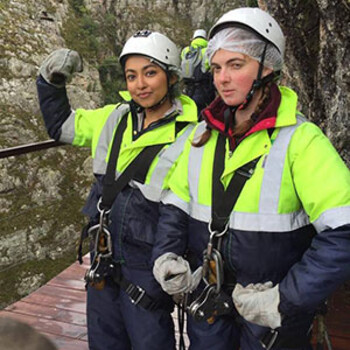Undergraduates Reflect on Summer Work Experience in South Africa
The Multidisciplinary Academic Program in Human Rights offers Yale undergraduates the opportunity to explore human rights from an interdisciplinary perspective, providing students with the analytical and practical skills necessary for human rights study and human rights-related careers. The Program is housed within the Orville H. Schell Center for International Human Rights at Yale Law School and accepted its first class of Human Rights Scholars in fall 2014.
Shyamala Ramakrishna and Charlotte Finegold, seniors in the Human Rights Program, interned at the Legal Resources Centre, South Africa’s largest human rights law clinic, at their regional office in Cape Town during summer 2016. The organization’s primary aim since 1979 has been to use the law as an instrument of justice for the country’s most marginalized and under-resourced populations. The LRC works along the lines of three overarching objectives of equality, democracy, and development. Its operations run the gamut of social and socioeconomic justice issues, from land and housing cases to LGBT anti-discrimination efforts to impact litigation cases on behalf of refugees and asylum seekers. The office comprises a dedicated team of attorneys, candidate attorneys, paralegals, and interns who meet regularly, consult with clients, and search for legal challenges to systemic problems.
Shyamala Ramakrishna: "Mandy Mudarikwa, the attorney with whom I was posted, primarily operates in the Equality & Non-Discrimination focus area. She prepares various impact litigation cases, shadow reports to the United Nations, and cases on behalf of refugees and stateless persons. I spent my summer reworking letters of support for stateless children, drafting a report on harmful customary practices for the UN Commission on the Status of Women, looking up case law on conscientious objections to officiating same-sex marriages, and researching inequitable law enforcement resource allocation in Cape Town’s poorest townships. The experience was valuable even beyond my assignments; watching Mandy and other attorneys talk through their cases at litigation-committee meetings exposed me to unprecedented structural challenges and angles by which to tackle them."
Charlotte Finegold: "I worked for William Kerfoot, who has been fighting for the rights of refugees (and countless others) for more than 30 years. The work was challenging and fast-paced: I conducted many intake interviews with asylum-seekers and refugees facing everything from the withdrawal of their status to obstacles to scrounging up the money to travel across the country to renew their asylum permit. I edited a fledgling NGO’s constitution and researched relevant case law on domestic workers' rights, death penalty & extradition, and South Africa’s refugee system. I spent my last few weeks drafting the LRC’s responses to the South African government’s proposals to house asylum-seekers in border detention centers. The enormous backlog in the South African asylum-system, unending tales of bureaucratic ineptitude, and even corruption, that stops children from going to school, obtaining birth certificates, and getting healthcare, would get me down. But William’s infectious passion, as well as the encouragement of all the LRC staff, made me eager for every new assignment."



